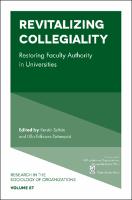Revitalizing Collegiality
Restoring Faculty Authority in Universities
Contributor(s)
Sahlin, Kerstin (editor)
Eriksson-Zetterquist, Ulla (editor)
Language
EnglishAbstract
The ebook edition of this title is Open Access and freely available to read online. The higher education and research system faces a constant dilemma. On the one hand, research and higher education are run by autonomous, interrelated academic communities, often described as collegial governance. On the other hand, they are an instrument for the fulfillment of goals that are often external to the academic community. What, then, is the role of academics and academic knowledge in governance of higher education and research, and how does this reflect on and impact their aims and overall place in society? Fostered through joint workshops and an open dialogue, this double volume of Research in the Sociology of Organizations develops a deeper understanding of collegiality, examining through a unique comparative perspective how it is translated and practiced in different settings across the world. Considering ways in which collegiality can be revitalized, this second installment argues for reintroducing collegiality both in analyzing the development of higher education systems and research and in the actual governing of universities. Revealing the globalization, homogenization and variation that have come to characterize the collegiate system, Revitalizing Collegiality critically considers the state of and future of the higher education system, and how we can consciously shape it moving forward.


 Download
Download Download
Download